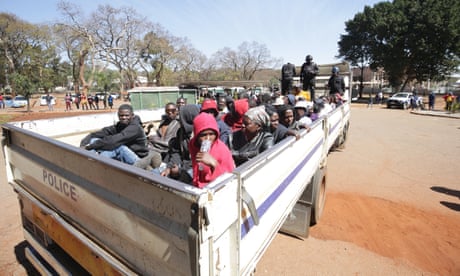
Delays have marred voting in Zimbabwe’s general election after a campaign dominated by the country’s interlinked economic crises.
Voting at most urban polling stations in Harare and Bulawayo began four hours late after polling officers failed to distribute papers for the council elections. Some polling stations were still to receive election material more than seven hours after polls opened.
Zimbabweans are electing a president, legislators and local authorities in an in a contest in which the incumbent president, Emmerson Mnangagwa, is seeking a second term.
Voters expressed their frustration at the delays, saying the Zimbabwe Electoral Commission (ZEC) had failed in its management role.
“I came here at 5am knowing that the queues will be long but four hours later I am still to vote. ZEC must do better,” Cynthia Muvirimirwa, 34, a schoolteacher said while standing in a queue nine miles (15km) north of central Harare.
Elderly people who queued early on Wednesday had to return home from a polling station in Mbare, one of the capital’s most populous suburbs as a result of the delays. “Authorities must look into this issue. Now we have the elderly waiting for hours without casting their vote,” Isaac Matara, 40, said.
The commission admitted there had been delays in printing ballot papers and called for calm. “We urge all voters at polling stations where delays have been experienced to remain patient,” it said in a statement. It later said voting hours would be extended from 7pm to 9pm in some places.
Political observers described the voting process as shambolic.
The opposition leader, Nelson Chamisa, who hopes to cause an upset and break Zanu-PF’s 43-year-old stranglehold on power, said the delays were meant to frustrate his supporters, but that his party would win despite them.
Addressing journalists in Harare, Chamisa said the delays had plunged the country into a constitutional and electoral crisis. Chamisa accused Zanu-PF of seeking to destabilise his support base in urban areas.
“The fact that they have targeted Harare, Bulawayo is an indication that they are scared of people in the urban areas,” he said.
In Kwekwe, where Mnangagwa voted, polling started at 7am as planned. There were long queues as the 80-year-old entered a small classroom to cast his ballot.

“I will win this election. If I was not confident I would not be running,” he told journalists.
Mnangagwa narrowly defeated Chamisa five years ago after the coup that deposed Robert Mugabe. He pledged to tackle the country’s decades-long economic crisis “head on” in his first term, but unemployment, inflation and falls in the value of the Zimbabwe dollar have persisted.
Zimbabwe has a history of disputed elections since its independence from the UK in 1980. Human rights groups said in the run-up to Wednesday’s vote that the same factors that blighted previous elections – voter roll irregularities, public media bias and the use of law enforcement and the courts to hamstring opposition campaigns – remained.
As dusk set in there were fears that some people might not manage to cast their ballot and that some stations might not be able to handle nighttime voting.
To win the presidency, a candidate will need to win more than 50% of the vote and two-thirds of the seats in parliament to claim a majority.


